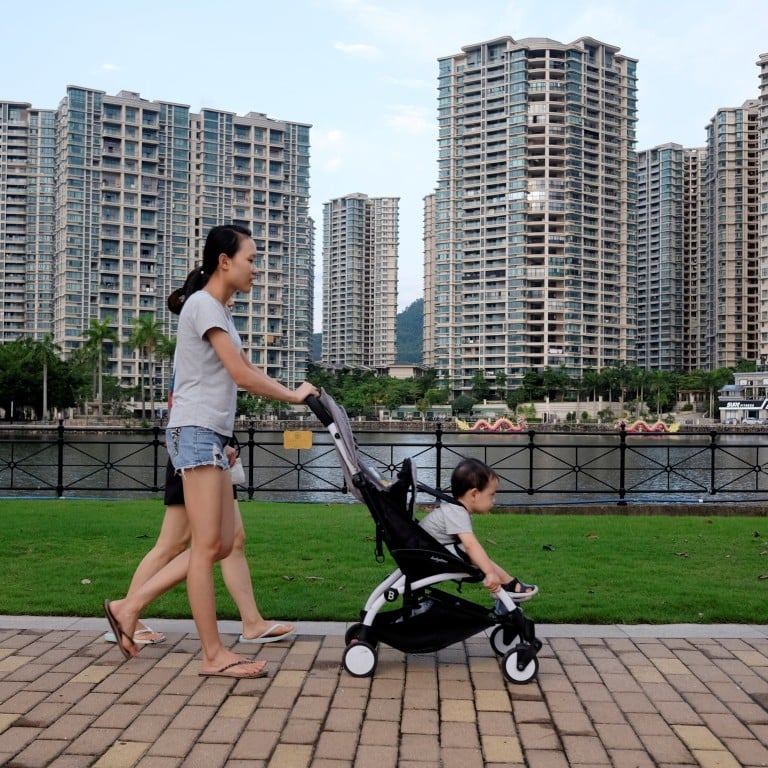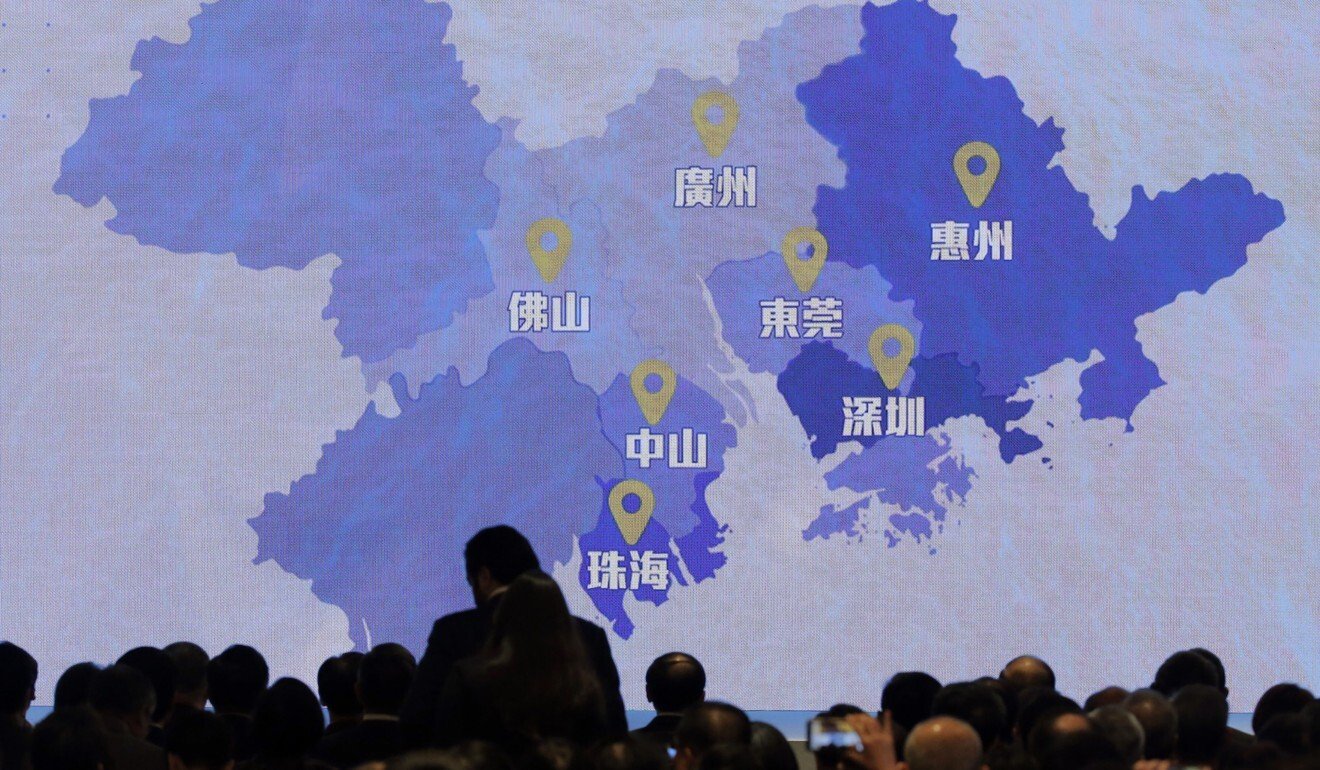
Explainer | Which city within the Greater Bay Area should Hong Kong’s residents consider for real estate investment?
- The biggest barrier to property investment in the Greater Bay Area (GBA) is the legacy price-control regulation left from the 2017-2018 campaign to cool real estate prices
- Eligible buyers are limited to one residential property each. First-time buyers must put down at least 30 per cent of the property’s value, mortgaging the remainder
For all the publicity and government commitment lavished on the “Greater Bay Area” (GBA), the nine cities in southern China adjoining Hong Kong and Macau actually offer limited investment opportunities and upside for the city’s residents.
The most daunting barrier that Hongkongers must overcome is the legacy price-control restriction left from the 2017-2018 campaign by local authorities to tame runaway real estate prices.
That means Hongkongers must have lived or worked in the GBA for up to five years to be eligible to own property. Only two cities, Zhaoqing and Huizhou – the furthest from Hong Kong – are exceptions to the rule.
In the remaining seven mainland cities, buyers without the local residency permit, or hukou, must contribute every month to the local social security fund, at least six months in smaller cities like Zhongshan, and up to five years in Guangzhou and Shenzhen, to be eligible to buy property.
Eligible buyers are limited to one residential property each. First-time buyers must put down at least 30 per cent of the property’s value, mortgaging the remainder. Second-time buyers are eligible for even less in bank loans. There is also a sales moratorium of between two to three years, to deter speculation.
“Investors should stay away from short-term speculation, but consider the long-term investment returns such as the rental yield, because the price rally of the previous years will not be replayed in the Greater Bay Area,” said K.K. Lai, China head at Centaline Property.
Property prices in the area are lagging Hong Kong’s bull market rally. The Centaline Greater Bay Area Index of 11 cities rose 5.5 per cent in the previous 20 months ended February, behind Hong Kong’s 6.1 per cent over the same period. The price gain in Shenzhen was 4.1 per cent over the same period, and 4.9 per cent in Guangzhou.
Hong Kong residents can buy a special type of apartment built on land that has been zoned for commercial use, because there are no restrictions imposed on these typically smaller and cheaper properties. The downside is that the land lease terms on these homes are typically shorter at 40 to 50 years, compared with the usual 70 years on other types of residential property.
Buyers must also put down 50 per cent of the purchase value themselves, and put up with higher utility bills that come with commercial space.
Infographic: How China’s cities are classified into different tiers
Buyers with higher risk appetites can consider the cities furthest from Hong Kong, such as Huizhou, or Zhaoqing, where there is no eligibility restriction. Zhaoqing’s average home price has risen 20.5 per cent over 20 months, according to Centaline.
The downside is that these cities face the same kind of risks as with most of China’s lower-tier cities: volatile prices with supply glut, population outflow and weak industrial base. Property analysts are particularly concerned about the market’s outlook after a two-year bull run.
In Huizhou, such a correction has already taken place, with the Centaline index slowing to 1.9 per cent since peaking at 8.4 per cent in July last year. Still, the outlay in a city like Huizhou will fetch a larger space: 1 million yuan (US$149,000) gets 90 square metres (969 square feet) in Huizhou, compared with 18 square metres in Shenzhen for the same investment, or 6.6 square metres in Hong Kong.

Here are the buying restrictions for non-local residents in each of the nine mainland Chinese cities in the Greater Bay Area:
Guangzhou: A buyer must show proof of tax payment, or contributing to the local social security fund (SSF) for at least five years to be eligible to buy one property. Bank loans are capped at 70 per cent of the property value for first-time buyers, and limited to 60 per cent for buyers with existing mortgages. The property is barred from reselling for two years.
Shenzhen: A buyer must show proof of tax payment, or contributing to the local social security fund (SSF) for at least five years to be eligible to buy one property. Bank loans are capped at 70 per cent of the property value for first-time buyers, and limited to 50 per cent for buyers with existing mortgages. The property is barred from reselling for three years, while apartments located in commercial zones cannot be resold within five years of their purchase.
Dongguan: A buyer must show one-year proof of social security fund payments to be eligible for one property; two years’ of payments for two homes. Bank loans are capped at 70 per cent of the property value for first-time buyers, and limited to 60 per cent for buyers with existing mortgages. The sales moratorium lasts for two years.
Foshan: A buyer must show one-year proof of social security fund contributions or tax payments to be eligible for one property. Bank loans are capped at 70 per cent of the property value for first-time buyers.
Zhuhai: A buyer must show five years’ proof of social security fund contributions or tax payments to be eligible for one property. Bank loans are capped at 70 per cent of the property value for first-time buyers. There is to be no reselling of purchases for three years.
Zhongshan: A buyer must show six months’ proof of social security fund contributions or tax payments to be eligible for one property. Two years’ proof of payment or contributions would be eligible for two homes. Bank loans are capped at 70 per cent of the property’s value for first-home buyers.
Jiangmen: A buyer must show six months’ proof of social security fund contributions or tax payments to be eligible for one property. An entire year’s proof of payment can be eligible for two flats. Bank loans are capped at 70 per cent of the property’s value for first-home buyers.
Huizhou: Bank loans are capped at 70 per cent of the property’s value for first-home buyers. A three-year sales moratorium will be in place.
Zhaoqing: Bank loans are capped at 70 per cent of the property’s value for first-home buyers, or buyers who have finished paying off their loans.

